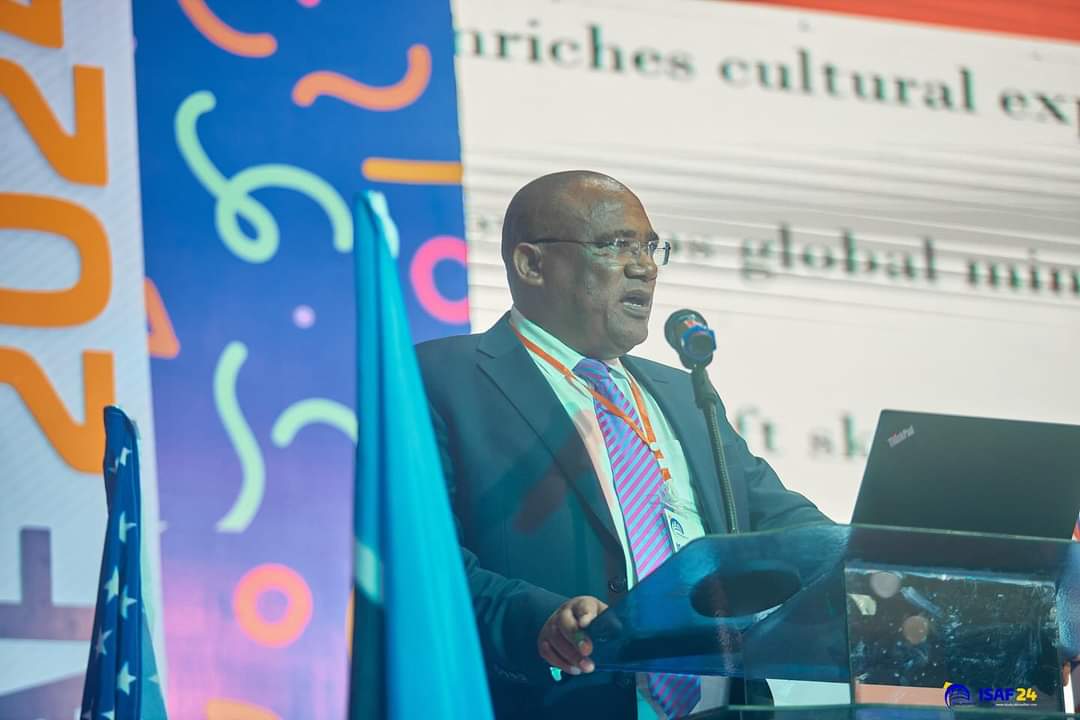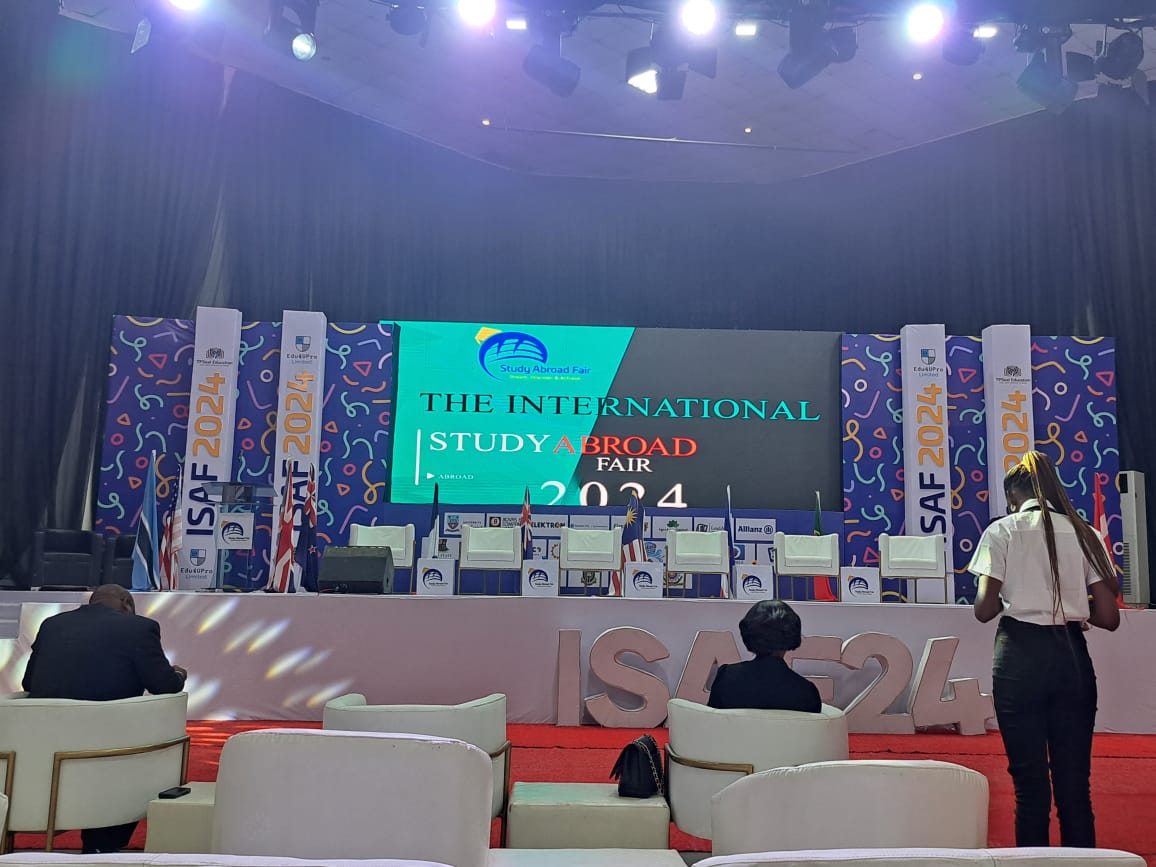Prof Norris Urges for Action Towards Realising African Union's Research Investment Target
 University of Botswana (UB) Vice Chancellor, Professor David Norris, says it is high time African countries started spending at least three (3) percent of their Gross Domestic Product (GDP) on research and development as per the commitment made at the 2006 African Union (AU) Summit in Addis Ababa, Ethiopia.
University of Botswana (UB) Vice Chancellor, Professor David Norris, says it is high time African countries started spending at least three (3) percent of their Gross Domestic Product (GDP) on research and development as per the commitment made at the 2006 African Union (AU) Summit in Addis Ababa, Ethiopia.
Professor Norris made this clarion call during the International Study Abroad Fair (ISAF) and Conference 2024 held in Ibadan, Oyo State, Nigeria on the 23rd February 2024 under the theme: “Accessing Education Beyond Borders: Embracing Global Opportunities.” Professor Norris was speaking on the topic, The Power of International Education: Transforming Lives and Shaping the Future.
His’ call for action derived from the 2006 AU Summit which gathered leaders from across the continent to discuss various issues pertaining to Africa's development. The summit convened with the objective of confronting pressing challenges hindering Africa's progress in addition to devising strategies to drive the continent's socio-economic advancement, with a particular focus on enhancing research and development initiatives.
During the summit, the leaders recognised the critical role of Research and Development (R&D) in driving innovation, fostering economic growth, and addressing the continent's pressing challenges. The leaders then committed to increasing investment in R&D by allocating at least three (3) percent of their respective GDP to research activities. The commitment was seen as a critical step towards building Africa's scientific and technological capabilities and promoting sustainable development across the continent.
Regrettably, as Professor Norris highlighted this week, the goal to allocate three (3) percent of GDP towards research and development remains elusive. To date, no African country has surpassed spending more than one percent on research and development.
“These are the things that we must reflect upon, and I think for Africa ’Talk Shows’ must really end. I think it is time we start implementing some of the agreements we made,” emphasised the Vice Chancellor.
Professor Norris underscored the importance of fostering an environment where young people could pursue education abroad and then return to contribute to the development of their home countries. He expressed concern over the current scenario whereby Africa's human capital predominantly benefits already developed nations, leaving the continent deprived of critical skills and expertise for its advancement.
He lamented that many young people misunderstood the concept of international education by assuming that it only involved studying in Europe or the United States of America. Conversely, Professor Norris point out that international education encompassed more than going to Europe alone, citing universities in Africa such as the University of Botswana, Ghana, or South Africa as prime examples. He advised African youth not to overlook the value offered by their own universities.
Furthermore, Professor Norris highlighted that even the world's top universities had their limitations and may not excel in every discipline. Therefore, he encouraged students to consider seeking education in institutions such as Makerere University, the University of Botswana, and the University of Ibadan where they could potentially find greater value and specialisation in specific disciplines that offer top in demand skills that are needed by the economy and 21st workplaces.
Professor Norris underscored the social responsibility of higher education such that the internationalisation of higher education benefitted not only individuals but also the broader community, both home and abroad. Such should entail contributions through education, research, service, and cross-cultural engagement aimed at fostering positive societal impact.
Regrettably, Professor Norris highlighted a lack of seriousness regarding the internationalisation of higher education in African universities. He noted a lack of institutional commitment and perceived internationalisation as just tours or visits instead of strategic initiatives. He underlined the need for structured administrative leadership and proper staffing in international offices as well as clear policies to guide the process and outcomes.
Moreover, Professor Norris advocated for the integration of international and intercultural dimensions into the formal and informal curriculum within local learning environments through leveraging virtual or online learning platforms where applicable.
He expressed concern over the disproportionate flow of human and f inancial capital to developed countries, emphasising the need for a bidirectional flow to benefit Africa. He called for investment in infrastructure to support quality education besides proactive solutions that address challenges instead of perpetual complaints about limited resources.
inancial capital to developed countries, emphasising the need for a bidirectional flow to benefit Africa. He called for investment in infrastructure to support quality education besides proactive solutions that address challenges instead of perpetual complaints about limited resources.
Meanwhile, ISAF is an international educational event designed to provide a dedicated platform to discuss how to harness global opportunities through international education and also avail assistance geared towards turning prospective students’ aspirations of seeking for further studies to reality. In this platform, University of Botswana, was amongst the participating institutions in Africa, marketing its study programmes, products and associated services. Professor Norris further participated in a panel discussion on the topic: Measuring and Assessing the Benefits of International Strategic Partnerships in Student Exchange Programme.